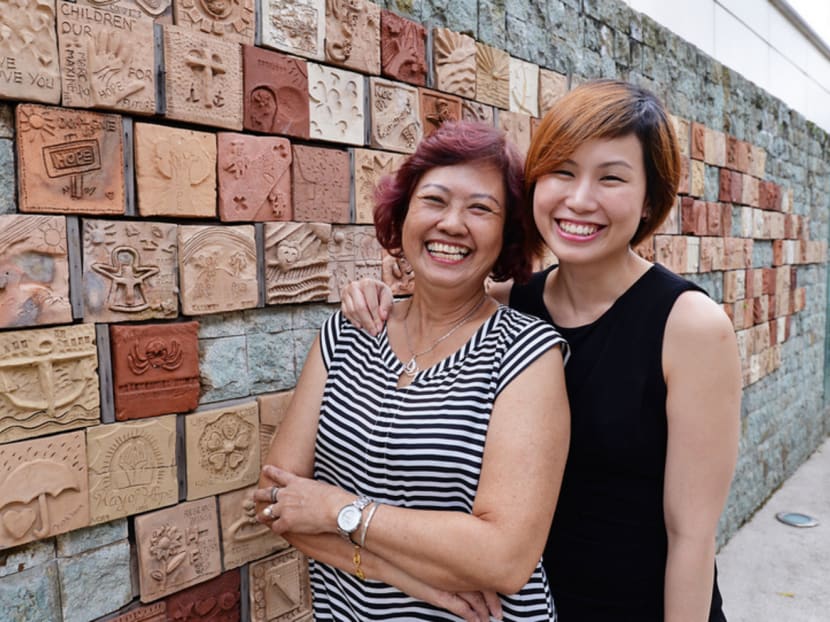Why cancer of the pancreas is so deadly
SINGAPORE — Diagnosed with late-stage pancreatic cancer after a spell of severe back pain two years ago, Mdm Sng Jek Choo was given just six months to live without treatment.

Mdm Sng Jek Choo (left), 61, with her daughter Ms Ooi Sue Anne. Mdm Sng, whose cancer is ‘stable’ but not totally eradicated, continues to live a fulfilling life, engaging in her favourite activities such as dancing, tai chi and travelling. PHOTO: ROBIN CHOO
SINGAPORE — Diagnosed with late-stage pancreatic cancer after a spell of severe back pain two years ago, Mdm Sng Jek Choo was given just six months to live without treatment.
Since then, the 61-year-old homemaker has undergone almost every form of conventional cancer treatment, including surgery, chemotherapy and radiotherapy, in a bid to stay alive. The National Cancer Centre Singapore (NCCS) patient also participated in a clinical trial in 2014 to test a new treatment for pancreatic cancer, but had to stop when she developed lung and breathing problems.
Despite her long-drawn battle with the disease, Mdm Sng knows she is fortunate to have come this far, given pancreatic cancer’s reputation for being aggressive and deadly.
The disease has claimed the lives of celebrities such as Patrick Swayze and Luciano Pavarotti, both of whom developed the most common form of pancreatic cancer known as pancreatic ductal adenocarcinoma. Apple Inc’s co-founder Steve Jobs, who succumbed to the disease in 2011, had a rare form of pancreatic cancer called neuroendocrine tumour.
In Singapore, it ranks as the fifth and sixth most common cause of cancer death among men and women respectively. The incidence and death rates for pancreatic cancer are about the same, which means those diagnosed have a high likelihood of dying from it, said Dr Yong Wei Peng, associate director (research) and senior consultant at the National University Cancer Institute, Singapore (NCIS), which sees 100 new cases each year.
At a time when medical advances have rapidly improved cancer survival rates, why is pancreatic cancer still so lethal?
Experts say the cancer’s initial silent symptoms and aggressive biological behaviour mean it is often too late by the time it is discovered.
The pancreas is an organ that secretes digestive enzymes and other hormones such as insulin to regulate the body. As the cancer advances, patients may develop yellowing of the eyes, tea-coloured urine and pale stools, unexplained weight loss and pain.
While it may be possible for a person to live without a fully functional pancreas, “it is the spread of the cancer to other vital organs that causes organ failure, and eventual death”, said Dr David Tai, a consultant medical oncologist at the NCCS, who added that the most common site of spread is the liver. The NCCS sees approximately half of all patients diagnosed with pancreatic ductal adenocarcinoma in Singapore.
In addition, there is currently no effective screening test to check for tumours in the pancreas, unlike other cancers such as colon or breast cancer. “As a result, most patients are diagnosed at a late stage and hence have relatively limited treatment options by then,” said Dr Yong.
MOST CASES areINCURABLE AT DIAGNOSIS
Even with treatment, the odds are often stacked against patients.
Curative surgery, conducted when the cancer is localised and amenable to complete removal, is usually the first line of treatment, followed by chemotherapy to reduce the risk of relapse. But the majority of pancreatic cancer patients are unable to undergo surgery either due to the tumour encasing major arteries or veins, or when imaging shows the cancer has spread to other organs, said NCCS’ Dr Tai.
According to him, 80 to 85 per cent of patients would have incurable pancreatic cancers at diagnosis. Of the 15 to 20 per cent with cancer that is operable, the five-year survival rate is 20 to 30 per cent.
“By contrast, up to three-quarters of colon cancer patients are amenable to curative surgery at diagnosis, and their five-year survival rate ranges between 65 and 95 per cent,” said Dr Tai.
For patients who are not amenable to surgery, palliative chemotherapy is the next best alternative; it will not cure the cancer but is effective in helping patients live longer with improved cancer-related symptoms, said Dr Yong.
PROGRESS IN STANDARD OF CARE, TREATMENTS
Some progress has been made in the area of treatment and standard of care for pancreatic cancer.
“This year, we have learnt that (the) combination of two different types of chemotherapy (gemcitabine and capecitabine) is better than one type of chemotherapy (gemcitabine) when given after curative surgery. Thus that is the new standard of care whenever possible,” said Dr Tai.
A new made-in-Singapore cancer drug targeting several cancers, including pancreatic cancer, colon cancer and stomach cancer, is currently being tested in a multi-centre clinical trial at NCIS and NCCS, and in Spain and the United States, said Dr Yong.
These cancers are linked to a group of cell-signalling pathways known as Wnt signalling, which can promote the growth and spread of cancer. Developed by Duke-NUS Graduate Medical School, Experimental Therapeutic Centre (ETC) and the Agency for Science, Technology and Research (A*Star), the targeted cancer therapy inhibits the pathways, thus suppressing cancer growth and progression.
Having completed radiotherapy last month, Mdm Sng, whose cancer is “stable” but not totally eradicated, continues to live a fulfilling life, engaging in her favourite activities such as dancing, tai chi and travelling. Mdm Sng’s 31-year-old daughter, Ms Ooi Sue Anne, believes her mother’s optimism has helped her survive her two-year cancer journey.
“The tumour is still sitting there inside my body, but it is sleeping at the moment. When I’m not doing anything, I start imagining the worst but mostly, I keep busy and (do) not fall into the ‘why me?’ mindset,” said Mdm Sng, who urged fellow cancer patients to maintain a positive outlook.
“Whether we are happy or not, we still have to live. I choose to be happy.”






